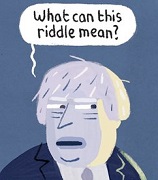|
Badger of Basra posted:Question about Renzi: he has talked up Tony Blair and said he's great and super cool. Do people outside the UK not realize that Tony Blair was terrible and widely loathed by the time he left? When Blair became party leader for Labour in the mid-90's, he set out to reform the party for the trials ahead. "New Labour" was born, gone with socialism, in with the social. Basically he did what other illustrious leftist like Mitterrand or Mario Soares did, years before, which was to put this socialism and labour rights thing in the closet and never speak of it again. Blair is also the last European(British) head of government to have been important, and is sold around as a guy who was faced with impossible choices with hard hitting consequences, but didn't flinch and has no regrets. Tough guy, for difficult days. Won't leave you hanging with a second rate politician in charge, just because the heat went up.(Gordon who?) This is what Renzi is selling. Reforming his centre-left Democratic Party, and also the electoral system in Italy. Plus a Solution for Italy woes. Italy needs a tough guy, for it's difficult days, and found it in Renzi, whose main competence is having a great smile and winning the grand prize on the Wheel of Fortune when he was a teenager.
|
|
|
|

|
| # ? May 2, 2024 02:58 |
|
Would it be a good idea to vote verhofstadt just because I support his scheme for a federal europe and he seems the quickest way to get there? Or are some of the more left leaning groups also quite pro a stronger europe? Plus at least he's competent even if I don't agree with him.
The Belgian fucked around with this message at 23:45 on Jun 9, 2015 |
|
|
|
The Belgian posted:Would it be a good idea to vote verhofstadt just because I support his scheme for a federal europe and he seems the quickest way to get there? Or are some of the more left leaning groups also quite pro a stronger europe? Plus at least he's competent even if I don't agree with him. You can't vote for who gets to be European Commissioner, that job now belongs to the Parliament(After a candidate is proposed by the Council). But the choice is probably going to fall into which dude has more seats representing his party, so if you want Verhofstadt you vote for whoever is running for the Alliance of Liberals and Democrats for Europe ticket in your country. As for Leftist being pro-Europe maybe the Greens?
|
|
|
|
Electronico6 posted:You can't vote for who gets to be European Commissioner, that job now belongs to the Parliament(After a candidate is proposed by the Council). But the choice is probably going to fall into which dude has more seats representing his party, so if you want Verhofstadt you vote for whoever is running for the Alliance of Liberals and Democrats for Europe ticket in your country. Yes, I know but Verhostadt is/ his party is running that ticket in my country. Will definitly look into the greens too.
|
|
|
|
The Belgian posted:Would it be a good idea to vote verhofstadt just because I support his scheme for a federal europe and he seems the quickest way to get there? Or are some of the more left leaning groups also quite pro a stronger europe? Plus at least he's competent even if I don't agree with him. He did a great job of building coalitions as a centrist in Belgium, but in Europe I imagine that he'd be far too outspokenly federalist to get anything of note done - he'd alienate huge chunks of the EPP and a large fraction of S&D right from the get-go. Regardless, it's all a bit academic since he's got no hope of taking the presidency. Are there any figures on projected turnouts around the union? edit - re: Blair, I think he gets an unfairly bad rap from the left on non-Iraq issues. People tend to forget that Labour ran on its traditional socialist platforms four times between 1979 and 1992 and lost horribly each time, even when the Tories were pushing policies that literally started riots and tanked the economy. Most of his domestic policies were reasonable compromises given that the public clearly had little appetite for unreformed social democracy, and New Labour did have a number of notable and unambiguously positive achievements that tend to get glossed over or straight up disregarded. LemonDrizzle fucked around with this message at 08:10 on Apr 24, 2014 |
|
|
|
LemonDrizzle posted:He did a great job of building coalitions as a centrist in Belgium, but in Europe I imagine that he'd be far too outspokenly federalist to get anything of note done - he'd alienate huge chunks of the EPP and a large fraction of S&D right from the get-go. Regardless, it's all a bit academic since he's got no hope of taking the presidency. You better hope no UK megathread posters see this. And I don't think it's unfair for him to be remembered mostly for Iraq considering it was against public opinion, done in spite of massive protests, and has been an unmitigated disaster. It's what he's going to be remembered for. His bizarre need to continue pontificating on what the Middle East needs (spoilers: it's bombs and secular dictatorship) just makes it worse.
|
|
|
|
Iraq's undoubtedly the defining issue of his premiership, but it's not like the invasion of random middle eastern countries was some kind of central plank of New Labour policy - it was just a badly thought out reaction to global events. If you compare his domestic aims to his actual accomplishments, he did fairly well. And of course, he turned an unelectable shitshow of a party that was riven by perpetual infighting into a crushingly successful election winner; if nothing else, he should be thanked for saving us from the prospect of Prime Minister Iain Duncan Smith. e: since this thread's about the EU, it's also worth noting that he did a pretty good job on that front, maintaining the UK's halfway in position without pissing too many people off. LemonDrizzle fucked around with this message at 09:17 on Apr 24, 2014 |
|
|
|
The Belgian posted:Verhostadt LemonDrizzle posted:centrist in Belgium  Seriously though, don't vote for Verhofstadt.
|
|
|
|
The only real accomplishments of Verhofstadt I and II involved ethical issues such as gay marriage and euthanasia. Other than that, his coalition was notable mostly for ignoring festering institutional issues and pissing away the budget surplus, thinking the good times of the early 2000's would last forever. Plus, I personally just really dislike his glib demeanor. Of course, in Belgium the European elections are just a sideshow since federal and regional elections are being held at the same time.
|
|
|
|
Phlegmish posted:The only real accomplishments of Verhofstadt I and II involved ethical issues such as gay marriage and euthanasia. Other than that, his coalition was notable mostly for ignoring festering institutional issues and pissing away the budget surplus, thinking the good times of the early 2000's would last forever. Plus, I personally just really dislike his glib demeanor. Yeah I know. I just support eurofederalism and he seemed the msot in favor of that. Although I wouldn't want the VLD running anything in Belgium, so I probably shouldn't let them them touch the EU either. Mayble I'll just vote green on every level for party that I dislike the least. The Belgian levels are going to be the most entertaining though, yeah.
|
|
|
|
LemonDrizzle posted:
They began winning elections by putting socialism\social democracy in the drawer and jumping on the Daily Mall-style propaganda and defending the pratices of the right. They don't have an unfairly bad rap from the left, they decided the interests of the working class (labor, if you will) should play second fiddle to winning elections and putting their boys in good jobs, meaning you can't depend on Labor to avoid pointless imperialistic wars, gutting the wellfare state or letting financial institutions run the country like a feudal state. The public was and still is lost about what it wants, a reaction of neoliberal economic policy being a disaster that is blamed on a supposedly bloated well-fare state. It's the job of a party to approach the common person and give him a political conscious about his surroundings and how the country can change for the better. That Labor, led by Blair, decided it was easier to just follow the right wing band wagon doesn't give him any credit. The Belgian posted:Yeah I know. I just support eurofederalism and he seemed the msot in favor of that. Although I wouldn't want the VLD running anything in Belgium, so I probably shouldn't let them them touch the EU either. Mayble I'll just vote green on every level for party that I dislike the least. The Belgian levels are going to be the most entertaining though, yeah.
|
|
|
|
Mans posted:They don't have an unfairly bad rap from the left, they decided the interests of the working class (labor, if you will) should play second fiddle to winning elections and putting their boys in good jobs, meaning you can't depend on Labor to avoid pointless imperialistic wars, gutting the wellfare state or letting financial institutions run the country like a feudal state.
|
|
|
|
In regards to Renzi his appeal is that same perception that Blair shook up British politics and turned things around for his party after such stagnation. Italian politics are always a mess and people are always fed up, but people in general are particularly angry now with the whole Monti administration, Bersani's failure to form a government and Letta's shaky government. One also has to remember that the only other recent truly successful Italian politician (Berlusconi) became PM precisely because he came out of nowhere with new political strategies and took advantage of the turmoil of the early 90s to completely shake up the political arena. In this regard, Renzi isn't coming from out of the field with a new party, but in terms of national-level politics he has succeeded in portraying himself as "new" and certainly isn't talking down the comparisons to Blairism. Another figure to look out for right now is Angelino Alfano, who's doing a decent job of shaking off the associations with Berlusconi.
|
|
|
|
Whatever happened to those calls to democratise the EU? Seems like ages ago that I heard about that.
|
|
|
|
R. Mute posted:Whatever happened to those calls to democratise the EU? Seems like ages ago that I heard about that. It's still around, it's just that these days Euroscepticism is on the rise. There are people still out there demanding that the Commissioner be voted in directly by the people, instead of council/parliament.
|
|
|
|
Electronico6 posted:It's still around, it's just that these days Euroscepticism is on the rise. There are people still out there demanding that the Commissioner be voted in directly by the people, instead of council/parliament.
|
|
|
|
R. Mute posted:What do euroscepticism and the democratisation of the EU have to do with each other? I get the impression that a lot of the people who had been calling for democratization now just want to dismantle the whole affair, so democratization has lost steam. Personally, I think the idea of a federal European state is cool, but A. I may be biased, being an American, and B. since I am an American, it's not my place to say.
|
|
|
|
I'm guessing that democratisation would lead to the dismantlement of parts of the EU, so I can see how they're related. I can imagine - y'know, in an ideal world - questions being asked about the farm subsidies, which account for a full third of the EU budget and which is just a hive of corruption, poorly thought out and implemented policy and waste.
|
|
|
|
R. Mute posted:What do euroscepticism and the democratisation of the EU have to do with each other? Much. Further democratisation, like for example the simple act of people voting for the Commissioner. A Commissioner elected by the people, will further legitimize his role as a the not just the head of the legislative body of the EU, but also that of every citizen of Europe. A "President of the European Union" without the proper title, and making him far more important than any head of government and state. For Britons, for example, he would rank higher than Queen, for French, higher than the President of the Republic. In short, the more the average citizen is required to participate in the EU, the more powers and strength the EU will have over the nation states. Euroscepticism puts a damp in this as it's opposed to loss of any kind of sovereignty.
|
|
|
|
Electronico6 posted:Much. Further democratisation, like for example the simple act of people voting for the Commissioner. A Commissioner elected by the people, will further legitimize his role as a the not just the head of the legislative body of the EU, but also that of every citizen of Europe. A "President of the European Union" without the proper title, and making him far more important than any head of government and state. For Britons, for example, he would rank higher than Queen, for French, higher than the President of the Republic. The only place where "europe" comes into play in that arrangement is that they are all sitting at one table while doing that, and that they then release some cleverly worded statement as result that can be interpreted by each head of state as his own victory to show at home. Right now, they will never ever give up that kind of power to a european president or somesuch.
|
|
|
|
R. Mute posted:Whatever happened to those calls to democratise the EU? Seems like ages ago that I heard about that. Well, of the three main bodies of the union the Parliament is directly elected and the Council is made up of representatives of the national governments of the member states (who are, obviously, elected). That only leaves the Commission, whose president is indirectly elected in that they're chosen by the Parliament; the president then selects the other 27 commissioners. The Commission could certainly be made more democratic (maybe by having each commissioner elected within their own country), but that aside it's not bad. The bigger issue is that its workings aren't well understood by the citizens of the member states and there haven't been many well-executed efforts to explain them, so it's easy for eurosceptics to misrepresent things for their own ends.
|
|
|
|
LemonDrizzle posted:The Commission could certainly be made more democratic (maybe by having each commissioner elected within their own country), but that aside it's not bad. The bigger issue is that its workings aren't well understood by the citizens of the member states and there haven't been many well-executed efforts to explain them, so it's easy for eurosceptics to misrepresent things for their own ends. Making the Commissioners directly electable would guarantee a non-existent turnout, I think; who the hell is going to enthusiastically go out and vote for the Commissioner for Maritime Affairs and Fisheries? Besides; which country gets which Commission post is a huge horse-trade inside the Council. We don't elect the Directors-General of our national departments either, and I'm happy for it to stay that way. The bigger issue, and you're completely right, is that it's hard to understand what the Commission is doing, and that the EC's PR efforts have been, at best, woeful. Living in Brussels, however, I've met a lot of Commission people, and I think they're collectively the best and most impressive civil servants that I've met in my life. The stereotype of 10-5 workers with 3 hours wine-soaked lunches is definitely false. It might have been true a few decades ago, but not anymore. EDIT: Latest poll update:  Tactical voters at this point may want to switch to S&D parties; preventing EPP from getting Juncker in would be a good idea, to say the least. Junior G-man fucked around with this message at 09:25 on Apr 25, 2014 |
|
|
|
European civil servants are generally highly competent and their examinations are no laughing matter, but their wages are appropriately inflated as well. Of course, it's a necessity in a lot of cases. My dad works for Eurostat in Luxembourg and he says they're already having trouble attracting people from places like the UK and Scandinavia. You're not going to move halfway across the continent if you can get the same pay in your own country.
|
|
|
|
Junior G-man posted:Making the Commissioners directly electable would guarantee a non-existent turnout, I think; who the hell is going to enthusiastically go out and vote for the Commissioner for Maritime Affairs and Fisheries? Besides; which country gets which Commission post is a huge horse-trade inside the Council. We don't elect the Directors-General of our national departments either, and I'm happy for it to stay that way. I actually think the PR problems go deeper than people not knowing what the Commission's doing: in the UK at least, most people don't know what the Commission/Council/Parliament are, never mind what they're up to at any given moment. There's also a woeful lack of coverage of goings-on in Brussels even when it concerns things that are of interest to the public - the only UK paper that had any decent coverage of the recent movements towards banking union and the new regulations on bailing in and out was the Financial Times.
|
|
|
|
Well Euronews is pretty good at at least touching on EU matters, which for TV news is actually phenomenal. Think it's only on satellite though (Freesat etc) Thanks for the effort thread Jr G (and everyone else), the bloc stuff isn't really what we usually deal with so there's a lot to read up on. It's like playing at living in a country with a modern democratic system!
|
|
|
|
Euronews is a great network. A certain Italian place I eat at often with friends always has it on tv at the back of the restaurant. It's one of the main reasons I go there! These days I've actively been trying to convince everyone I know to vote for the EU parliamentary elections and how important it is. Hopefully the voter turnout will be decent.
|
|
|
|
Oh, what do you know, Eurosceptics are terrible, terrible MEPs. Euractiv posted:Full article here I'm so
|
|
|
|
Junior G-man posted:
Shouldn't it make your job easier? If they abstain from voting all the time you won' t have to
|
|
|
|
NihilismNow posted:Shouldn't it make your job easier? If they abstain from voting all the time you won' t have to Unfortunately not, and for three reasons: 1. These people are loving crazy and will just do whatever the hell they want, which is usually what gets them the front page and never mind if makes any sense / has a chance of moving forward. They're not reliable enough to just take a hint/position paper/question and move forward with it. 2. You can't afford to be too close to these people; the big EP groups and important MEPs take a very dim view of those who try to get their stuff in through these people (also see reason 1). If your issues/position is being seen as articulated by the EFD/Non-inscrit crazies, then your issues will also be seen as crazy. 3. They can't/don't have any real influence because they don't know the meaning of negotiation or compromise. While there may be more of them this time round, there's little chance of the cooperating functionally with other MEPs, which means that they can't get poo poo done. There was a whole piece in the Dutch papers this weekend about people who used to work for Geert Wilders and the PVV who now can't get a job anywhere. People look at their CV and latest position and just go "well, I cannot afford to be associated with that".
|
|
|
|
How much direct interaction do European civil servants have with MEPs?
|
|
|
|
LemonDrizzle posted:How much direct interaction do European civil servants have with MEPs? I'm sure Junior G-man knows better than me, but from what I do know, it's quite substantial, particularly as regards interaction between the European Commission (which really constitutes the bulk of the EU civil service), and MEPs. If you've got one body with the right of legislative initiative, and two other bodies that are involved in approving, modifying or rejecting legislation, a certain level of coordination is essential to making sure everything works.
|
|
|
|
LemonDrizzle posted:How much direct interaction do European civil servants have with MEPs? Pesmerga answered it pretty well, but specifically MEPs now have the right of Questions and Answers (Q&A). To hold the EU institutions accountable, MEPs have the right, as granted by the European Parliament Rules of Procedures 115, 116 and 117, to pose questions to the Commission, Council and other European Union bodies either orally during the Plenary sessions or in a written form. MEPs can thus ask a whole range of questions, ranging from the banal and stupid to vital questions of security etc., to the European Commission and Council, which are then forced to answer them. So, theoretically at least, there is full accountability to MEPs. In practice ... But there are also questions like this: quote:The fashion company Louis Vuitton has reportedly set a limit on the number of its products (in particular women’s handbags) that individual customers may purchase in its stores. Junior G-man fucked around with this message at 14:29 on Apr 28, 2014 |
|
|
|
For the two, three of you who follow the elections, EP Presidency candidates debate tonight at 19:00 CET! In the ring will be Juncker, Schultz, Verhofstad and Keller! http://www.euronews.com/2014/04/14/what-will-you-ask-the-potential-future-president-of-the-european-commission/
|
|
|
|
Junior G-man posted:For the two, three of you who follow the elections, EP Presidency candidates debate tonight at 19:00 CET! On this topic, there was an article last week about Van Rompuy, and his attitude towards the election of the President. European Voice posted:Van Rompuy casts doubt on value of Spitzenkandidaten Courtesy of European Voice - http://www.europeanvoice.com/article/2014/april/van-rompuy-causes-a-stir/80615.aspx Really, it's essential that as many European Union citizens turn out to vote as possible. If the European Parliament is going to be seen as a legitimate player in European politics, and indeed, to raise the quality of the MEPs and their active participation in policy making, increased public involvement and scrutiny is one of the only ways to ensure this.
|
|
|
|
Van Rompuy does kind of have a point - how many European citizens have even heard of Schultz or Juncker, never mind actually wanting one of them to have arguably the most powerful job in EU politics? OTOH, I wonder how he feels about making common cause with Farage: https://www.youtube.com/watch?v=bypLwI5AQvY
|
|
|
|
Quite irrelevant to the elections as such, but since Junior G-man is pretty open: Junior G-man, what did you study and how did you become a civil servant for the EU? I'm asking because I'd like to become one too when I graduate
|
|
|
|
Deltasquid posted:Quite irrelevant to the elections as such, but since Junior G-man is pretty open: I studied English Literature To become and EU civil servant is balls-hard. The proper way is the concours of the Commission, has just closed for the year and consists of many many rounds of testing and interviews. To give you an idea, about 30.000 people applied for 138 entry-level jobs this year, and many of those will have one or more master's degrees, speaking 3 languages fluently is pretty much base-line and 1-2 years of experience will help out a lot. French and English are vital, anything else is gravy. The better option if you want to start as a full-time employed person is to work as an MEP assistant, and this means you need to start networking your local political party early and often. Very often these positions aren't posted online but through the national party's own network. Whatever the case though; DO AN INTERNSHIP (if you can afford it). Nearly all non-institution job offers mandate one or more internships, preferably with the Commission or EP. You can find more info here. Beware that there is 6-9 months between applying to Blue Book and actually getting an internship due to the pace of admin, and that it's also competitive as gently caress. However, EP or EC internships are usually obtainable to interested people with good grades; anything international you study, and especially extracurricular stuff (preferably international like an Erasmus exchange etc.) will stand you in good stead. EC internships also pay 1.000 - 1.100 euro per month, which can sustain you in Brussels if you like eating a lot of ramen. Plus, the internship will help you network and get to know Brussels. This is vital for any further career moves. Brussels is surprisingly small and very 'who do you know' based. I can talk a bit more about this or what I do if people are interested or have other questions. Though obviously I won't tell you my employer. Junior G-man fucked around with this message at 15:59 on Apr 28, 2014 |
|
|
|
Junior G-man posted:I studied English Literature Thanks for your reply! I'm wondering because I'm actually in my second bachelor as a law student in Belgium, and European law is what interests me most. Considering I natively speak Dutch, French and English and study some German on the side, it's one of the reasons I'm interested in that. (Although it's still quite a long way before I even get my master's degree, heh.) I live near Brussels. Better start getting the networking part under my belt as soon as I can  And yeah, obviously don't disclose confidential stuff.
|
|
|
|
You can always look at doing a master's or other postgraduate at the College of Europe which is supposedly a very good way into sneaking your way in the door. Competitive and expensive though.quote:I live near Brussels. Better start getting the networking part under my belt as soon as I can If you're able, I suggest finding out some conferences/events on whatever interests you in European law or otherwise and just register for them. It's good to know these kinds of events and the language that's spoken there. Usually when you're on a few mailing lists you get auto-invited for more. Obviously the coffee break is where you would whore yourself out to the Junior G-man fucked around with this message at 16:05 on Apr 28, 2014 |
|
|
|

|
| # ? May 2, 2024 02:58 |
|
Junior G-man posted:You can always look at doing a master's or other postgraduate at the College of Europe which is supposedly a very good way into sneaking your way in the door. Competitive and expensive though. Definitely a great way of getting in, it's informally called the 'Commission training school' for a reason. It's very heavily focused on policy and works with the assumption the people there are planning on that career path. They generally say that if you've got a genuine interest in the European Union and how it works, you go for the College of Europe if you want to run it, and the European University Institute if you want to study/criticise it. Lemon Drizzle posted:Van Rompuy does kind of have a point - how many European citizens have even heard of Schultz or Juncker, never mind actually wanting one of them to have arguably the most powerful job in EU politics? Sorry, just saw this as well. He does have a point, but the question is why he is making it. There's a certain level of anti-populist style sentiment he's demonstrated in the past, which while reasonable when referring to more extremist elements such as Golden Dawn, for example, in his case it seems to be heavily influenced by the Belgian political system and all its troubles. As such, he doesn't seem to have much time for parliamentary bodies from what I can see, and besides, it's pretty bad form for the ostensible head of the EU to be talking down the importance of one of its key institutions, essentially referring to them as powerless and unimportant, particularly given the ordinary legislative procedure of the EU now includes codecision by the Parliament. And rumour has it that the Commission and Council were more than a little irritated by the sudden relevance of the Parliament when it rejected the Anti-Counterfeiting Trade Agreement. Pesmerga fucked around with this message at 16:08 on Apr 28, 2014 |
|
|





















